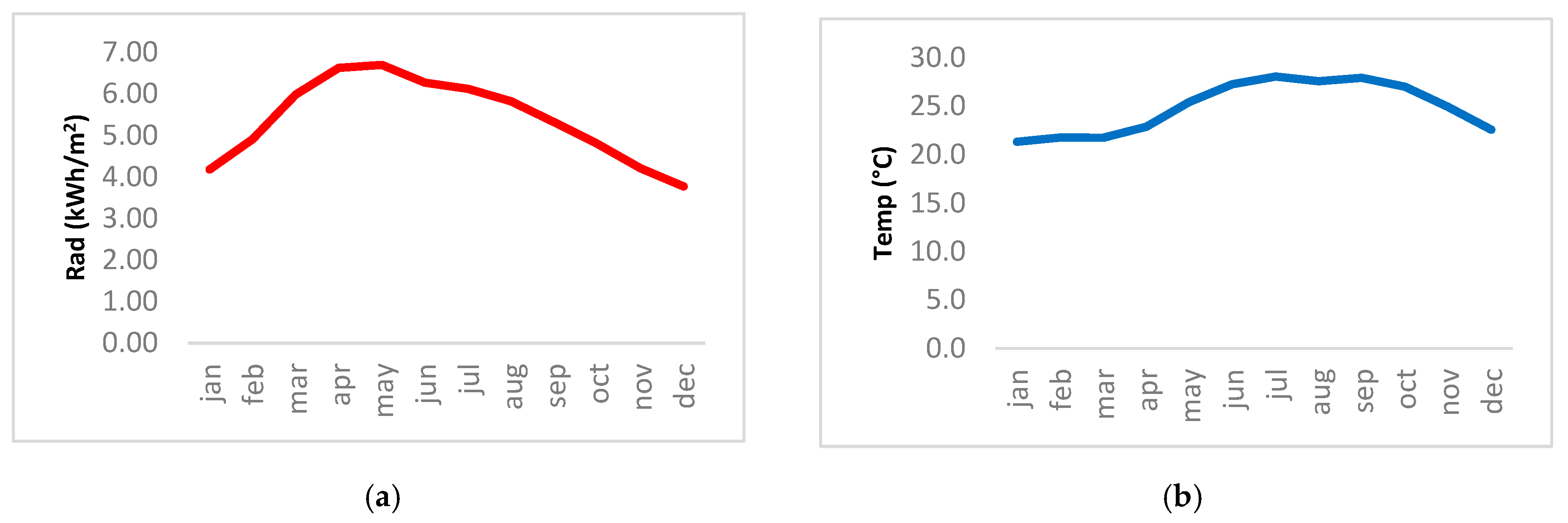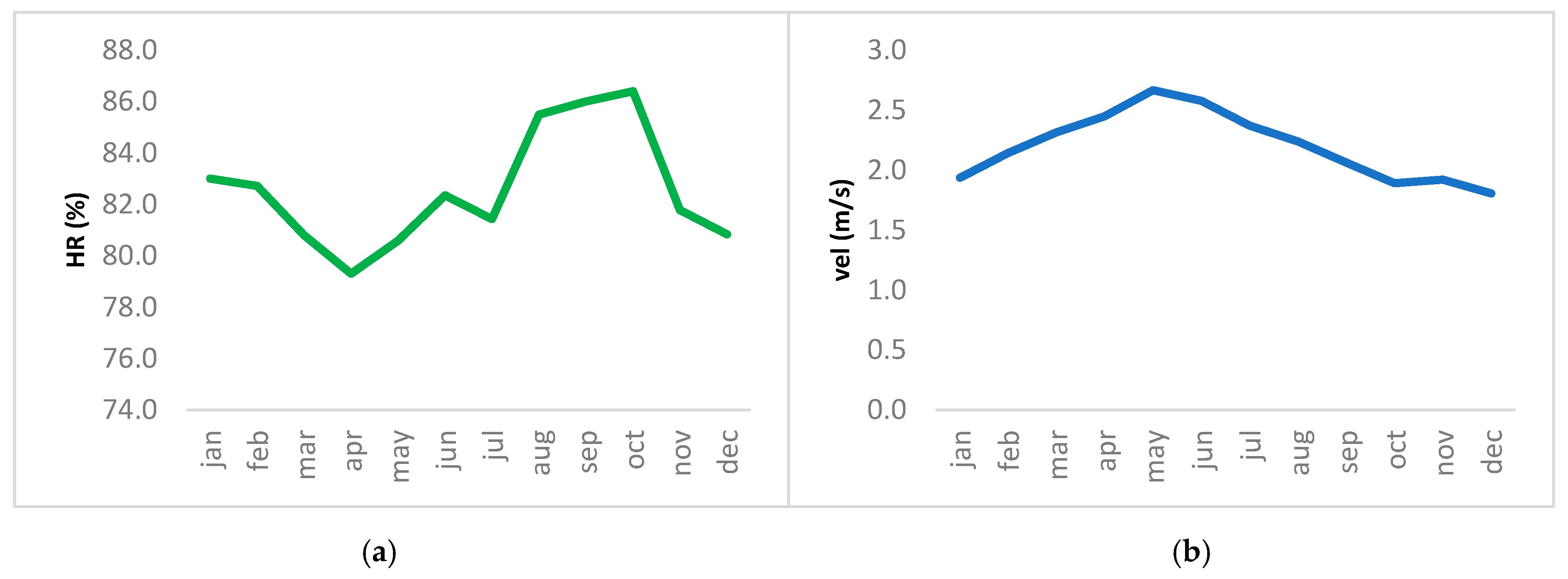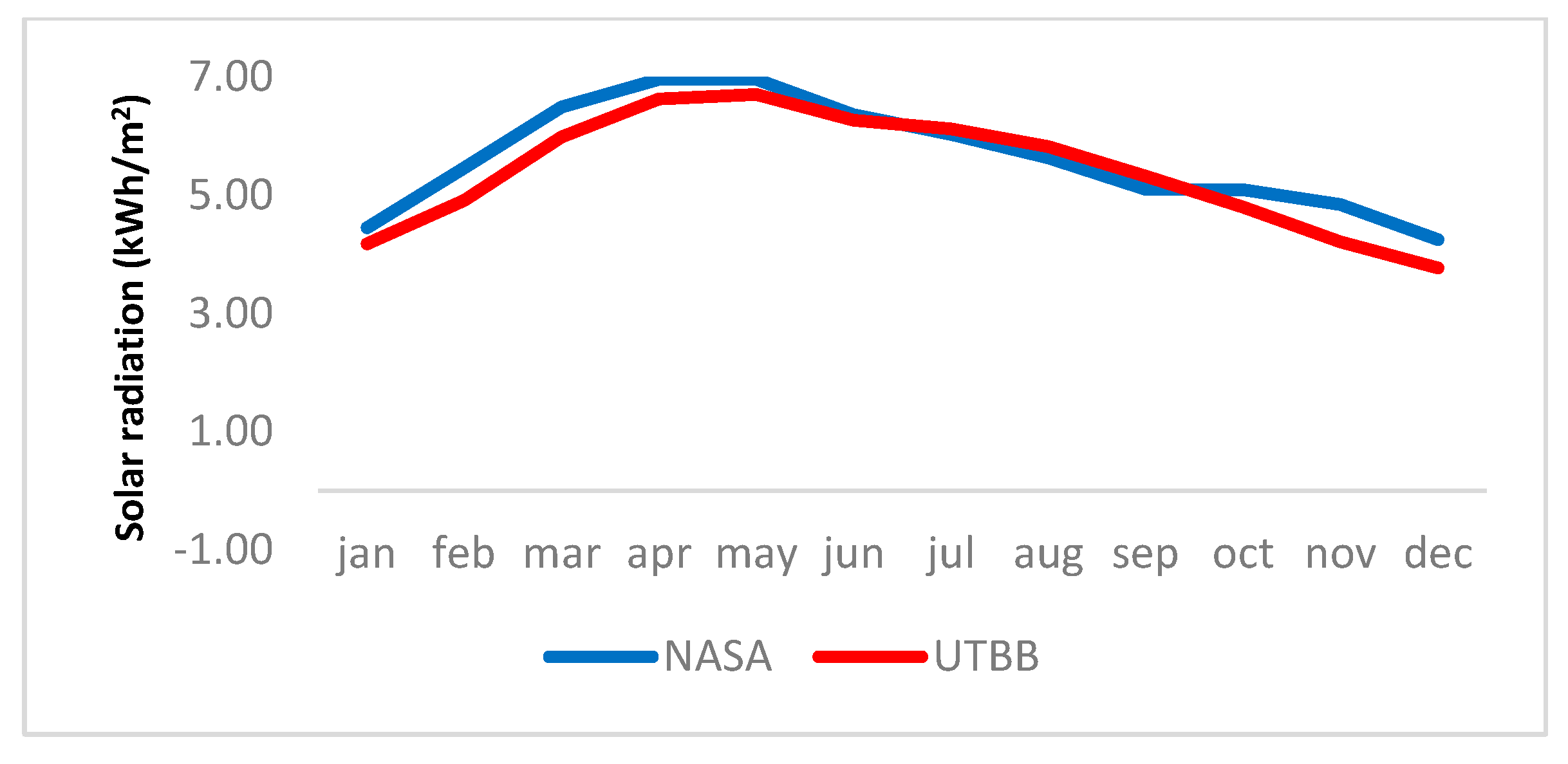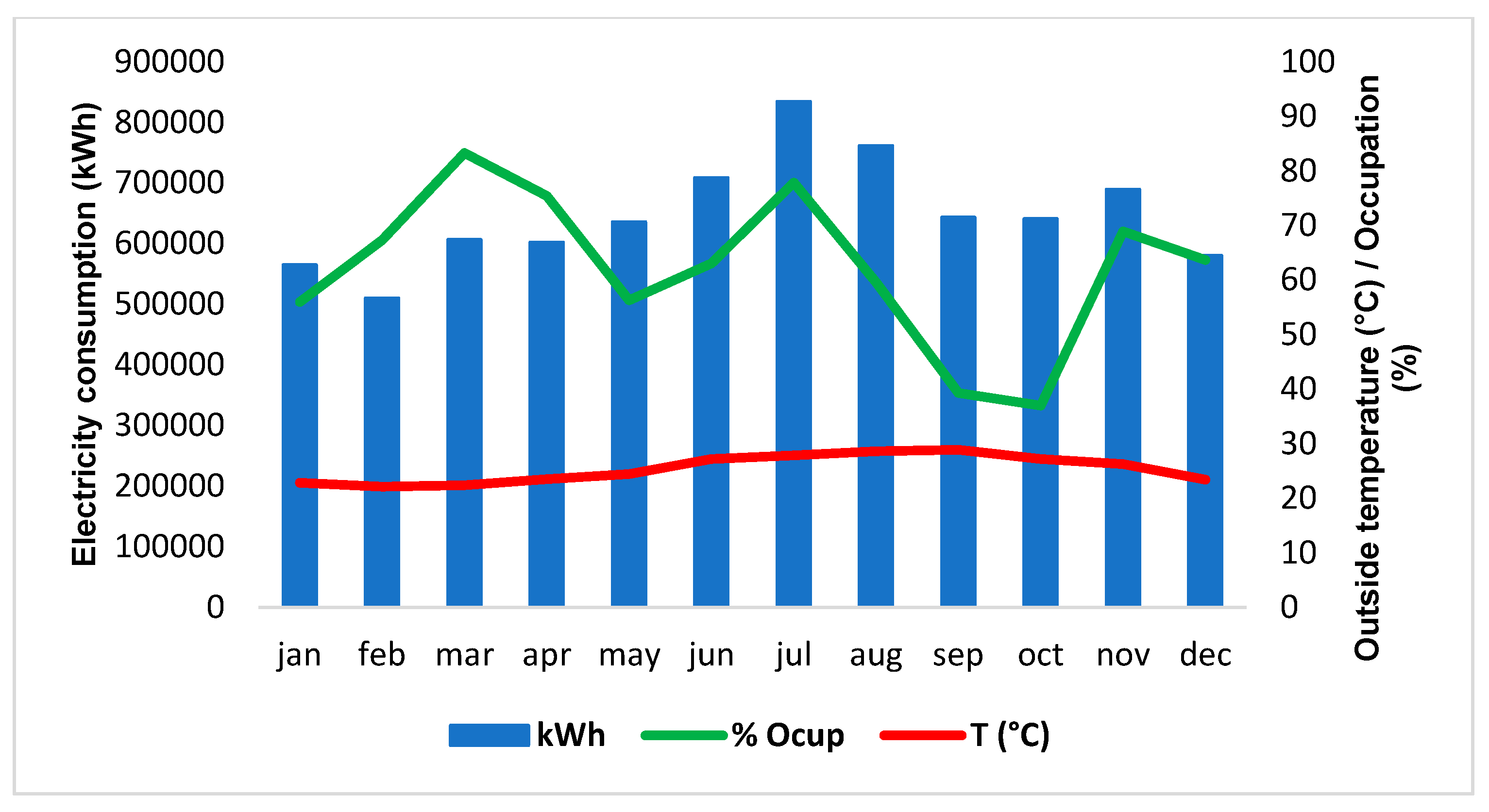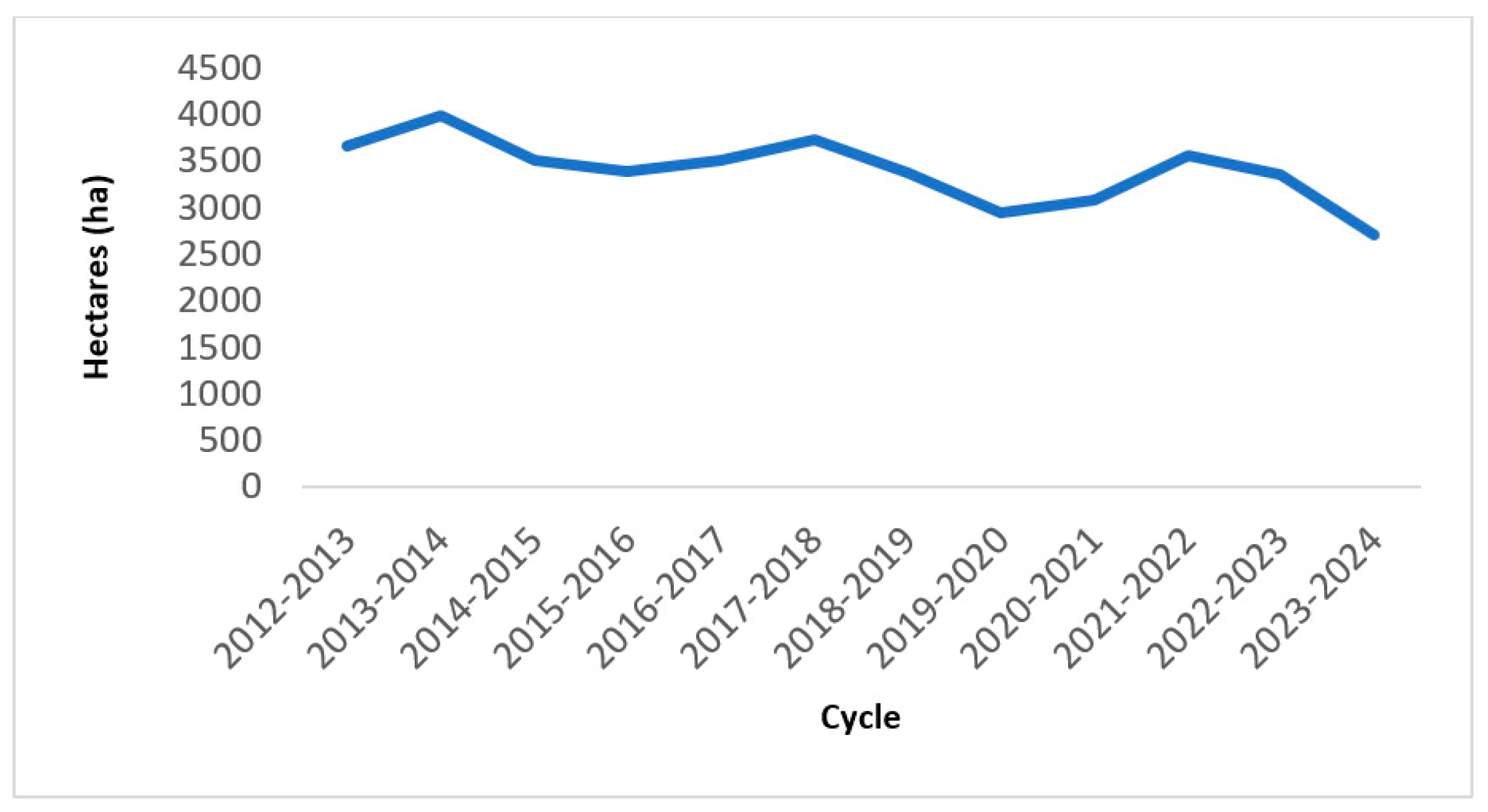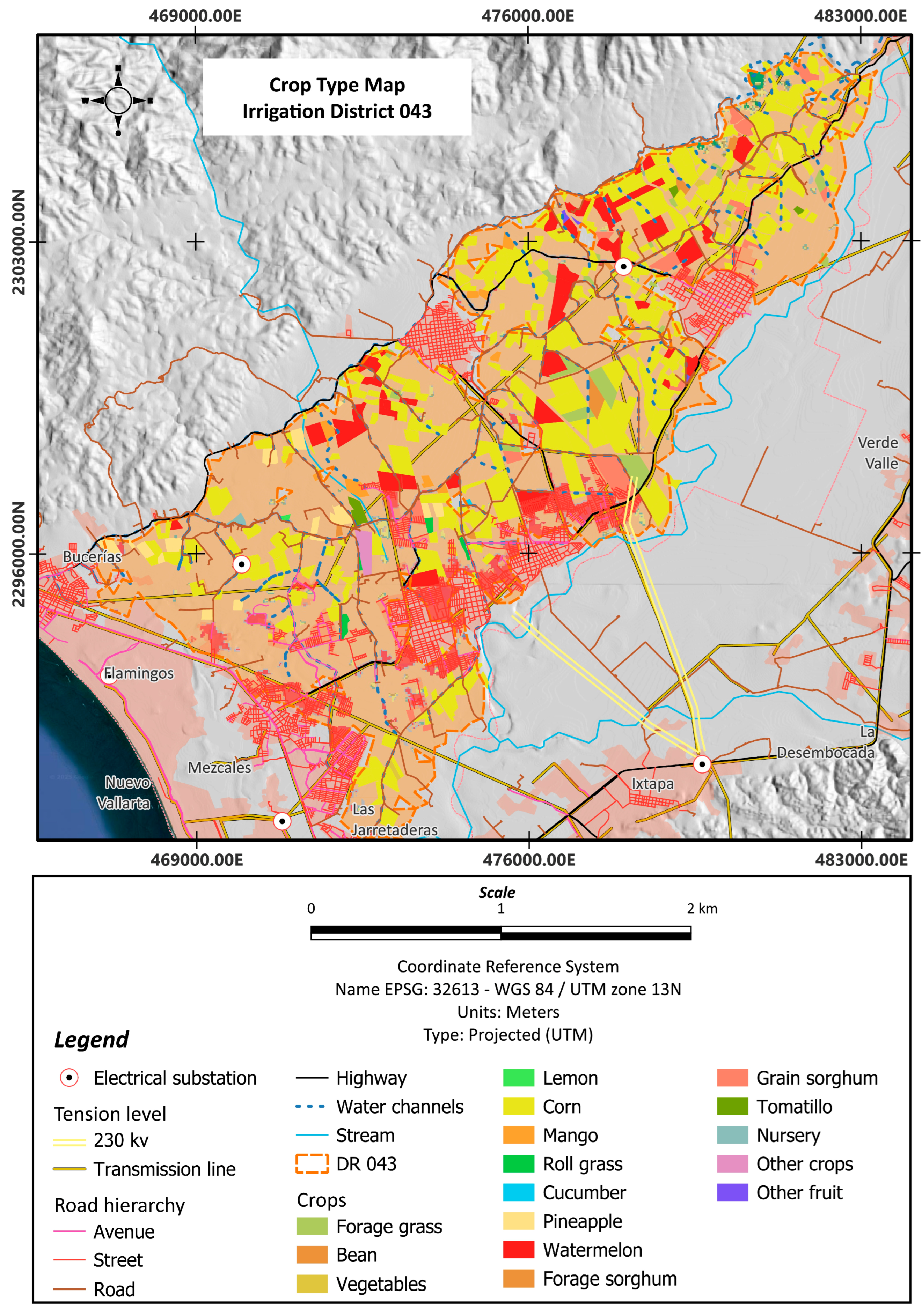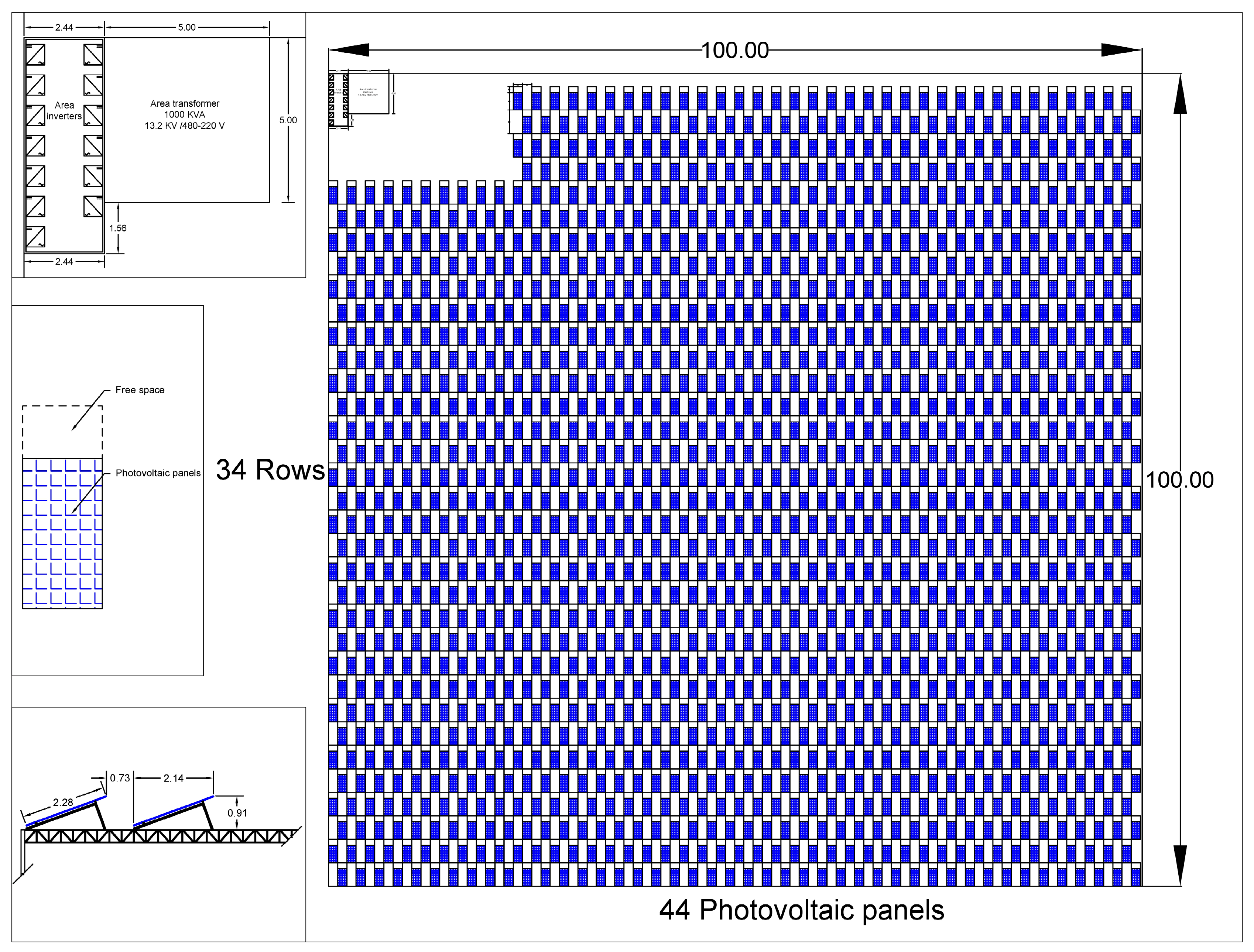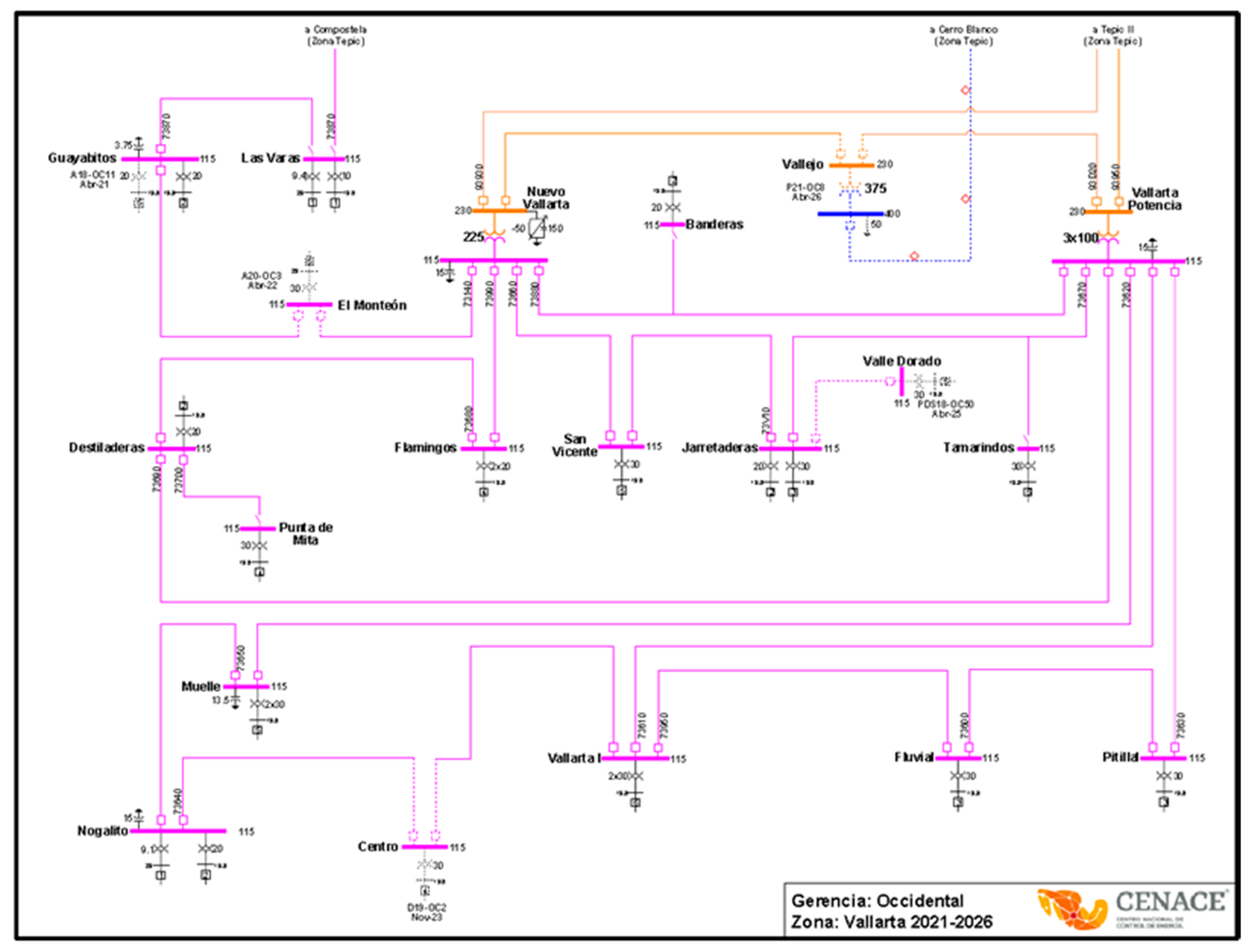1. Introduction
Hotels in tropical climates consume more electricity than those located in temperate zones, especially luxury hotels with four- and five-star categories [
1,
2,
3,
4,
5]. This high energy consumption generates greenhouse gases (GHGs), with negative effects on both the environment [
3,
6,
7], as well as the profitability of the hotel sector due to high electricity costs. Among the main actions that contribute to reducing GHG generation in buildings are energy efficiency and the incorporation of clean energy [
7,
8,
9]. However, according to the literature reviewed, the adoption of this latter alternative remains limited in the hotel sector [
9,
10]. The reasons are diverse, including high initial investment costs and the spatial requirements for installing photovoltaic solar modules. Therefore, this article proposes leveraging the proximity of agricultural fields to tourist destinations to implement an agrivoltaics system that supplies clean energy with minimal environmental impact. This strategy aims to establish a functional synergy between the agricultural and hospitality sectors, promoting a sustainable and regionally integrated energy model.
Faced with this problem, it was decided to study a tourist destination to identify whether it faces the same challenges, analyze the reasons behind the limited use of renewable energy, and evaluate technically and economically viable solutions. Puerto Vallarta; Jalisco; and Nuevo Vallarta, Nayarit, located among the top three beach destinations in Mexico, were selected as case studies [
11].
In recent decades, the hotel industry in tropical destinations such as Puerto Vallarta and Nuevo Vallarta has faced a dual challenge: meeting the growing demand for high-end services, with their high energy consumption, and reducing its environmental footprint. In Mexico, the tourism sector contributes approximately 8.4% of greenhouse gas (GHG) emissions, according to the Instituto Nacional de Ecología y Cambio Climático (INECC) [
12]. Luxury hotels, highly dependent on HVAC and lighting systems, represent a critical point in this scenario. Furthermore, in Jalisco and Nayarit, electricity costs for tourist establishments have increased by 18% between 2019 and 2024, according to the Comisión Reguladora de Energía (CRE), underscoring the need for solutions that balance profitability and sustainability [
13], so they need to improve even though these hotels already use energy management and efficiency measures.
The increasing energy demand in the hospitality industry, particularly in high-irradiation tourist regions, has driven the integration of distributed renewable energy systems, such as grid-connected photovoltaic (PV) arrays. However, as previously noted, a key constraint in this sector is the limited availability of space for rooftop and ground-mounted PV installations, since hotel infrastructure tends to prioritize guest-oriented spaces over areas dedicated to energy systems. Given this limitation, there is a need to explore innovative alternatives for implementing electricity generation systems that do not compete directly with urban or tourist spaces. Agrivoltaics emerges as an innovative alternative in this context. By integrating solar photovoltaic generation with agricultural production in the same space, land use is maximized [
14], and multiple benefits are obtained: reduction of dependence on fossil fuels and mitigation of GHG emissions [
15].
For regions such as Bahía de Banderas, where average solar radiation exceeds 5.3 kWh/m
2/day and land availability is limited [
16], but there are nearby agricultural fields (less than 3 km from the destination), this technology represents an opportunity to transform spaces that allow for the generation of clean energy and contribute to local agricultural production, reducing operating costs and strengthening self-sufficiency [
17]. Furthermore, in the future, agrivoltaics systems can be improved through the use of artificial intelligence (AI), AI-driven energy management systems (AI-EMSs), and sensors. This will not only optimize energy production but also reduce water waste and increase crop yields, as traditional irrigation methods do due to inaccurate scheduling and a lack of real-time data on crop needs [
18,
19].
The objective of this study is to propose technically and economically feasible alternative solutions with a low environmental impact for hotels in Puerto Vallarta and Nuevo Vallarta to use alternative energy sources that contribute to GHG mitigation and reduce electricity costs. These alternatives include agrivoltaics models adapted to the technical, economic, and ecological needs of the hotel sector in Puerto Vallarta and Nuevo Vallarta, integrating an energy community approach between farmers and hoteliers. Given that the hotel sector faces space limitations for the installation of photovoltaic systems, farmers can implement agrivoltaics crops, optimizing the use of their land for the generation of renewable energy to supply the hotel industry. Through an interdisciplinary approach, the feasibility of this collaboration will be evaluated considering key factors [
20]: the potential for energy generation, integration with local supply chains (e.g., the cultivation of native species for hotel consumption), the impact on reducing electricity costs, and mitigating GHG emissions. The results aim to offer a strategic framework that allows tropical hospitality to not only meet sustainability standards but also consolidate its position as a benchmark in eco-efficient innovation, aligning with the Sustainable Development Goals (SDGs) and the demands of an increasingly conscious tourism industry [
21].
2. Materials and Methods
This study adopts an interdisciplinary approach to evaluate the feasibility of implementing agrivoltaics systems as a strategy to reduce greenhouse gas (GHG) emissions, optimize energy costs, and foster the creation of energy communities involving both farmers and hoteliers. The methodology was structured into five main stages.
The first stage involved an analysis of the local context and a review of the relevant literature. The region’s energy and agricultural landscape was evaluated, taking into account public policies, current regulations, and previous energy transition initiatives implemented in tourist destinations. Additionally, national and international experiences with agrivoltaics systems in the hospitality sector were examined to identify success factors and potential challenges. However, a comprehensive review of the scientific literature revealed no documented cases that specifically integrate agrivoltaics systems into hotel operations, highlighting a significant research gap and reinforcing the novelty of this study.
In the second stage, the technical and economic feasibility of implementing photovoltaic (PV) systems in agricultural fields was evaluated. This assessment considered variables such as solar radiation, land availability, crop compatibility, and potential synergies with nearby hotels. To determine the most suitable renewable energy technologies for the region, local climatic conditions were characterized through the analysis of solar radiation, ambient temperature, wind speed, and relative humidity. These meteorological parameters were measured using properly calibrated instruments, including Kipp and Zonen pyranometers (model CMP3) and DAVIS weather stations (model Vantage Pro2 Plus Wireless), installed at three locations: the University of Guadalajara’s Centro Universitario de la Costa, the Universidad Tecnológica de Bahía de Banderas, and the Puerto Vallarta Airport. Data obtained from these sources were validated against satellite-based information to ensure accuracy and reliability. In parallel, an economic analysis was conducted to estimate investment, operation, and maintenance costs, as well as to examine potential financing schemes and business models that support the development of energy communities.
The third stage focused on the characterization of energy consumption in the hotel sector. Information was collected from a sample of 13 hotels ranging from 2- to 5-star categories, located in the Metropolitan Area of Puerto Vallarta and Nuevo Vallarta. A non-probability convenience sampling method was used [
22], and structured interviews were conducted with hotel maintenance managers [
23]. The bottom-up method was employed to estimate overall electricity consumption and GHG emissions in the region, using room-by-room consumption indicators provided by the participating hotels. This analysis also enabled the identification of energy demand patterns and opportunities for integrating renewable energy sources.
In the fourth stage, energy simulation and modeling were carried out using the System Advisor Model (SAM 2024.12.12) software. This tool enabled the modeling of potential energy generation from PV systems installed in agricultural fields under various implementation scenarios. Furthermore, the study estimated the impact of these systems on GHG emission reductions and assessed the economic benefits for both farmers and hoteliers. Scope 1 and Scope 2 emissions were calculated using the Greenhouse Gas Protocol (GHGP) for organizations, developed by the World Resources Institute (WRI) and the World Business Council for Sustainable Development (WBCSD), and adopted in Mexico by the Secretaría de Medio Ambiente y Recursos Naturales (SEMARNAT) [
24,
25].
Finally, based on the outcomes of the previous stages, a model for energy communities adapted to local conditions was developed. Implementation strategies were proposed, considering technical, economic, and regulatory aspects, as well as mechanisms for cooperation between the agricultural and hospitality sectors.
This comprehensive methodological approach provides a robust foundation for the adoption of agrivoltaics systems in tourist destinations, contributing to the environmental and economic sustainability of the hotel sector and aligning with the Sustainable Development Goals (SDGs).
3. Results and Discussion
In Puerto Vallarta and Nuevo Vallarta, from 2017 to 2019, an average of 3,449,286 tourists were received annually; 63% were domestic, and 37% were foreign, with 75% of the rooms occupied. The pattern [
26] shows that domestic tourists arrive at the destination especially during the hot season, while foreigners arrive when the weather is cooler (
Figure 1), which is why the destination’s hotels operate and consume energy year-round, unlike other destinations that operate seasonally [
27,
28].
As of 31 December 2017, a total of 22,577 rooms were registered in 1-to-5-star hotels in the tourist destination, of which 22,187 rooms corresponded to 2-to-5-star hotels [
26], representing 98.3% of the total categorized rooms. Of these, 20,067 rooms (90.4% of the total) belonged to luxury four- and five-star hotels [
26].
According to the Centro Mario Molina (2015) [
8], the number of rooms in Mexico grew at an average rate of 3.3% annually between 1984 and 2014, and this growth rate was confirmed by the Secretaría del Medioambiente y Recursos Naturales [
29] for the period 2015–2018. For Puerto Vallarta and Nuevo Vallarta, a 3.3% annual growth in the number of rooms was observed, going from 15,495 rooms in 2007 to 22,723 rooms in 2020 [
26]. Based on this steady growth, the number of rooms in 2-to-5-star hotels is estimated to reach 28,767 by 2025. Of this figure, 2749 rooms are projected to be in two- and three-star hotels, and 26,019 rooms will be in luxury four- and five-star hotels (
Table 1).
These projections highlight the expansion trend of the hotel sector in the region, which implies a growing demand for resources and, therefore, the need to optimize energy consumption and sustainability strategies in hotel infrastructure.
Of the 30 hotels where requests were made, only 13 agreed to provide information. It took more than a year of various procedures to obtain it. No information was obtained on fuel consumption from mobile sources or refrigerant consumption in air-conditioning and refrigeration equipment, and none provided information on end-use energy, whether for air conditioning, lighting, or other systems. The 13 hotels that provided information were highly diverse, ranging from a boutique hotel with 28 villas to a 723-room hotel with six 10-story towers (
Table 2). All hotels surveyed receive electricity from the Comisión Federal de Electricidad (CFE). They do not import chilled water, steam, district hot water, coal, compressed air, or any other external energy source. They also use liquefied petroleum gas (LPG) from private companies for cooking, laundry, and hot water, and diesel for emergency power plants. The electricity, LPG, and diesel consumption for each hotel and average values are presented in
Table 3.
Based on the data presented in
Table 2 and
Table 3, the average electricity consumption per room in 2-to-5-star hotels was estimated at 19,267 kWh per room per year. When disaggregated by category, two- and three-star hotels reported an average consumption of 5929 kWh/room-year, while luxury four- and five-star hotels reached significantly higher values, with an average of 22,184 kWh/room-year.
Using the general average of 19,267 kWh/room-year, the total electricity consumption of the tourist destination in 2017 was estimated at approximately 427 million kWh per year. However, when the calculation is refined by applying differentiated consumption values by hotel category, the total annual electricity consumption increases to 458 million kWh for that same year, reflecting the disproportionate influence of luxury hotels on overall demand.
Projecting future consumption, and assuming an annual growth rate of 3.3% in the number of rooms in Puerto Vallarta and Nuevo Vallarta, estimates indicate that by 2025, the total electricity demand of the 2-to-5-star hotel sector will reach 593.5 million kWh per year. Of this total, approximately 97%—equivalent to about 577 million kWh/year—will correspond to luxury four- and five-star hotels, as shown in
Table 4.
These results highlight the substantial energy demands associated with higher-category hotels. They underscore the urgency of implementing comprehensive energy efficiency strategies and integrating renewable energy sources to reduce environmental impacts and optimize energy use in tourist destinations.
The average annual GHG emissions for each hotel in
Table 2 and
Table 3 for the period 2017 to 2019, both scope 1 and scope 2 and total in tCO
2e/year, as well as GHG emissions per room and per-hotel, are shown in
Table 5, and an average indicator of 12.2 tCO
2e/room-year is obtained.
Considering the average greenhouse gas (GHG) emissions per room and disaggregating by hotel category, it was estimated that two- and three-star hotels generate approximately 4.4 tons of CO2 equivalent (tCO2e) per room per year, while four- and five-star luxury hotels reach an average of 14.5 tCO2e/room-year. These values are consistent with the higher electricity consumption intensity observed in upper-category hotels.
In terms of total emissions, the hotel sector in 2017 emitted an estimated 270,681 tCO2e when using a generalized average across all categories. However, when emissions are calculated using differentiated values by hotel class, total emissions increase to 300,831 tCO2e, which provides a more accurate reflection of the real environmental burden of the sector.
Projections for 2025, assuming no improvements in energy efficiency or emissions mitigation practices, indicate a continued upward trend in GHG emissions. For the hotel sector, emissions are expected to reach 350,963 tCO
2e when using a non-segmented average. When emissions are disaggregated by hotel category, this figure rises to 390,054 tCO
2e, as presented in
Table 6.
These findings clearly demonstrate the growing environmental impact of the hotel industry, particularly in the upper segments. They emphasize the urgent need to implement comprehensive energy efficiency measures, accelerate the integration of renewable energy sources, and adopt carbon mitigation technologies to reduce the sector’s carbon footprint and promote sustainable tourism in the region.
Regarding greenhouse gas (GHG) mitigation strategies and energy efficiency practices, the analysis revealed significant differences between two- and three-star hotels and luxury four- and five-star hotels in the evaluated tourist destination.
In the case of two- and three-star hotels, most have initiated the replacement of incandescent and fluorescent lighting with LED technology, although some establishments are still in the transition process. These hotels typically rely on liquefied petroleum gas (LPG) for cooking and water heating, using outdated equipment that contributes to low energy efficiency and higher GHG emissions. Pool heating is generally absent, and air-conditioning systems are often more than ten years old, further reducing energy performance. Moreover, these hotels lack formal energy-saving policies or structured equipment replacement programs, replacing units only when breakdowns occur and budget conditions permit. They do not utilize residual heat from their equipment for internal thermal processes, nor have they installed solar photovoltaic (SPV) or solar thermal (STE) systems, primarily due to financial constraints. Nonetheless, many of these establishments have expressed interest in adopting solar technologies and possess adequate rooftop space to do so. Environmental certifications or participation in sustainability programs are absent across this segment.
Conversely, luxury four- and five-star hotels demonstrate more advanced practices. These hotels are equipped with modern and efficient technologies for water heating and air conditioning, designed to optimize energy consumption. They have implemented a range of energy management measures, including lighting control through presence sensors, high-efficiency motors, and chiller-type air-conditioning systems, most of which are less than ten years old and incorporate variable frequency drives to enhance performance. Additionally, many of these hotels utilize residual heat from cooling systems to supply thermal energy for water heating and, in some cases, to heat swimming pools. They also maintain well-established energy management and savings policies. A majority of these establishments either hold or have held environmental certifications such as EarthCheck, with others in the process of certification. While the use of solar thermal energy (STE) is encouraged among these hotels, its broader implementation remains limited due to insufficient rooftop space.
This contrast underscores the disparity in technological modernization and environmental commitment across hotel categories, highlighting the importance of targeted support mechanisms to facilitate energy transitions in lower-tier establishments.
This analysis highlights the need for incentives and support programs for equipment modernization in lower-category hotels, as well as the growth potential in the adoption of renewable energy in the hotel sector.
Table 7 presents a detailed summary of the implementation of energy systems in hotels, indicating the presence of SPV and STE. It also specifies whether these establishments have mechanisms for the use of residual energy (AER) and whether they have incorporated advanced energy efficiency (TAE) technologies to replace equipment in the last 10 years.
Our analysis of
Table 1 and
Table 2, without considering groupings, reveals that electrical energy consumption in hotels is 244% higher than thermal energy consumption. When grouping establishments into two- and three-star categories and into luxury four- and five-star hotels, the ratio between electrical and thermal energy consumption in the latter increases even further, reaching 276%. Although higher-category hotels have implemented various energy efficiency and energy management strategies (
Table 7), the use of alternative energy sources is minimal. However, the integration of PV systems could represent a key strategy for reducing electricity consumption and mitigating greenhouse gas (GHG) emissions.
In order to characterize the climate of the destination and determine the viability of alternative energy sources, the monthly behavior of solar radiation, average temperature, wind speed, and relative humidity in Puerto Vallarta and Nuevo Vallarta for the period 2017–2019 are presented below (
Figure 2 and
Figure 3).
Figure 4 shows the comparison of the behavior of the average monthly horizontal global insolation by NASA satellites (1990 to 2019) versus the measurements made at the Universidad Tecnológica de Bahía de Banderas (2015 to 2019) with a Lin’s concordance [
30] strong between both data sources with ρc = 0.9244.
In this region, the average daily horizontal global insolation measured was 5.4 kWh/m
2-day, with extreme values of 6.7 kWh/m
2-day in May and 3.8 kWh/m
2-day in December. The average annual temperature was 24.9 °C, with average extremes of 21.3 °C in January and 28.1 °C in July. The average annual relative humidity was 82.6%, with a minimum of 79.3% in April and a maximum of 86.4% in October. This high humidity generates feelings of muggy conditions [
31,
32] and increases the demand for air conditioning systems, which not only reduce air temperature but also its humidity [
31]. The average annual wind speed was 2.2 m/s, with a minimum of 1.8 m/s in December and a maximum of 2.7 m/s in May. Based on these data, it is concluded that the wind power generation potential in the area is limited, as at least 4 to 6 m/s is required for wind generators at a height of 10 m above the ground [
33]. However, solar radiation levels are optimal for its utilization. This suggests that the implementation of solar thermal or photovoltaic systems is an efficient and viable alternative for this tourist destination. In particular, generating electricity through photovoltaic systems represents an effective solution for meeting the energy demands of the hotel sector.
A statistical analysis (
Table 8) with Minitab 2019 software was performed to evaluate the relationship between electricity consumption, hotel occupancy (Oc), and atmospheric variables (Tc, Rd. HR, and Vel). The results indicate that occupancy had a significant impact on electricity consumption in 5 of the 13 hotels analyzed (with
p < 0.05), while the average monthly temperature influenced 8 of the 13, and relative humidity in 2 of the 13. The coefficient of determination (R
2) exceeded 90% in 8 of the 13 hotels, demonstrating a strong correlation between these variables and energy consumption. However, in the case of hotel 5, the coefficient of determination was remarkably low, and the causes of this atypical behavior were not clearly identified. These findings are consistent with previous studies [
34]. In particular, for hotels located in tropical climates, electricity consumption is mainly related to the demand for air conditioning for thermal comfort [
1,
4,
35]. From the statistical analysis, it can be concluded that the variables that significantly influence electric power consumption are Tc, Oc, and HR respectively.
In order to analyze the relationship between hotel occupancy, temperature, and electricity consumption,
Figure 5 shows the behavior of electricity consumption of hotel 11 (
Table 8) during 2019 based on monthly occupancy (%) and average monthly temperature (°C). The statistical significance (
p) values corresponding to this hotel are found in
Table 8, where it is observed that occupancy was the factor with the greatest influence on electricity consumption, with a
p-value of 0.000. The regression equation obtained for this case presents a coefficient of determination (R
2) of 95.94%, which indicates a high degree of fit and a strong correspondence between the model and the actual behavior of energy consumption in said period.
Four- and five-star luxury hotels in this tourist destination have indicated that the main constraint to the adoption of SPV systems is the lack of available space on their buildings’ rooftops, as well as the perceived low efficiency of these systems (
Table 7). Consequently, they have opted for alternative strategies, such as replacing technologies with more efficient equipment, optimizing energy management, and harnessing residual energy. Another viable alternative would be the implementation of Combined Heating and Cooling (CHCP) systems; however, natural gas is unavailable in the region, and the use of Liquefied Petroleum Gas (LPG) is considered economically unviable for generating electricity due to its high cost. Furthermore, this option would not contribute to reducing greenhouse gas (GHG) emissions into the atmosphere. However, there are agricultural fields in the surrounding areas with the potential to implement agrivoltaic systems, which have adequate space for the installation of photovoltaic infrastructure with minimal environmental impact. To take advantage of this alternative, the following solutions are proposed:
Energy cooperative model: Farmland owners could form energy communities or cooperatives, establishing themselves as owners of the generating plants. The energy produced would be sold to luxury hotels, allowing the land to continue being used for agriculture and generating additional economic benefits.
Hotel ownership: Luxury hotels could take ownership of the generating plants and lease the agricultural land back to the original owners, allowing them to continue their farming activities simultaneously.
Third-party leasing model: An outside company could lease the farmland from its owners, install photovoltaic systems, and sell the generated energy to luxury hotels, guaranteeing the energy supply without the hotels having to assume the initial investment. The farmers continue to farm the plots at the same time.
The legal framework in force in Mexico for photovoltaic generation systems is governed by the following:
Ley de la Industria Eléctrica 2014 [
36],
Manual de Interconexión de Centrales Eléctricas [
37],
Código de Red, año 2022 [
38].
The current interconnection modalities in Mexico are classified into two categories, according to the generation capacity:
In the case of Distributed Generation, the current Electricity Industry Law establishes that the maximum installed power capacity of generating plants must not exceed 0.5 MW. However, it is currently being updated to increase this limit to 0.7 MW, with the possibility of approval in 2025. All power plants with a generating capacity exceeding 0.5 MW must operate within the Wholesale Electricity Market (MEM). Based on the above and the data presented in
Table 3, all hotels analyzed in the sample could participate in the MEM, given that their electricity consumption exceeds 1 MWh, which allows them to be considered Qualified Users [
39].
On the other hand, the agricultural fields located near the tourist destination are part of Distrito de Riego 043, Bahía de Banderas Section. According to information provided by the Oficina de Usuarios del Agua of Distrito de Riego 043, planting permits in this area may vary annually, meaning that the same plot may be used for different crops at different times. In this context, the implementation of agrivoltaic systems should not present significant conflicts [
40], provided that the selected plots are planted with low-growing crops (less than 3 m), such as pineapple, watermelon, and tomato, among others [
41,
42]. To assess the potential of these lands, an analysis was conducted of the cultivated area and the types of crops present in the area adjacent to the hotel complex. It was found that, between 2012 and 2024, the average agricultural area with planting permits was 3397 hectares (ha), with a downward trend in recent years (
Figure 6). This trend could be associated with the conversion of agricultural land to residential use, driven by the growth and expansion of the tourist destination.
The permits for crops planted in the area in the 2023–2024 cycle are shown in
Table 9, highlighting the cultivation of corn with 71% of the planting permits.
Figure 7 shows a map with the distribution of crop types in the 2023–2024 season, the water supply network, roads, and the electricity distribution network in Distrito de Riego 043, adjacent to the tourist destination and which has the farmland where solar farms can eventually be installed to supply electricity to luxury four- and five-star hotels and reduce almost 400 thousand tCO
2e by 2025 alone.
Analyzing information provided by the Distrito de Riego 043 Management and local farmers, it was found that planting permits in the region can be modified annually and that some farmers rent land from plot owners. This means that the same plot can be used for different crops at different times, facilitating the implementation of agrivoltaic systems without significantly affecting agricultural production. In this context, the establishment of low-growing crops (less than 3 m), such as pineapple, watermelon, tomato, and others, is considered viable on the plots selected for the installation of photovoltaic infrastructure [
43]. It is advisable to carry out studies to verify the impact of partial shading on some of these crops, since no reports were found in the case of pineapple and watermelon, although, in other crops, they allow water savings and other important benefits [
44].
Solar Farm Sizing: Typical Case per Hectare
Based on the data presented in
Table 3, it is estimated that in 2025 the annual energy consumption of four- and five-star hotels in Puerto Vallarta and Nuevo Vallarta will be 577,185,495 kWh, which is equivalent to a daily consumption of 1,581,330 kWh/day. Considering that the average daily sunlight in the destination is 5.4 kWh/m
2 (
Figure 2) and assuming an 80% efficiency for a photovoltaic system, an installed capacity of 366 MWp is required to meet the energy demand of these hotels. For the implementation of this solar farm, the use of 600 Wp monofacial solar panels with dimensions of 2278 mm × 1134 mm is proposed, arranged in a 1-to-1 configuration, a description of the proposed PV system is shown in
Table 10. This distribution considers an adequate separation to avoid shading between panels during the winter, optimizing the capture of solar radiation for a latitude of 20.5° N (
Figure 8 and
Figure 9). In addition, it is proposed that the panels be installed on metallic structures at a height of 3.5 m, allowing the passage of agricultural machinery, such as tractors, and ensuring that the crops receive approximately 50% of the solar radiation that they would receive under unshaded conditions. This agrivoltaics model would not only contribute to the generation of renewable energy for the hotel sector, but would also encourage the efficient use of agricultural land, promoting a synergy between food production and electricity generation [
43,
45].
Figure 9 shows the layout of the photovoltaic solar farm, designed with a density of 0.88 MW/ha. In the specific case of the luxury hotels in Puerto Vallarta and Nuevo Vallarta, the area required for the development of the agrivoltaics project would be 420 hectares (ha) by 2025, which represents approximately 12% of the average crop area of Distrito de Riego 043, Banderas Bay area. Since an area of 420 ha is required for the installation of the photovoltaic panels, it is proposed that they be located on farmland near the electrical substations of Nuevo Vallarta, Banderas, and San Vicente, with the objective of minimizing transmission costs and energy losses. However, it is essential to consider the technical and regulatory requirements established by the Centro Nacional de Control de Energía (CENACE), since these depend on the size of the project and the conditions of the electrical grid in the area. Regarding the interconnection to the electrical system, it is relevant to note that the energy supply in this tourist destination comes from the Comisión Federal de Electricidad (CFE), with an electrical flow from Tepic, the capital of the state of Nayarit, through a 230 kV line that feeds the electrical substations S.E. Nuevo Vallarta and S.E. Vallarta Potencia [
46]. From these substations, power is redistributed to other substations via a 115 kV network (
Figure 10). This interconnection scheme highlights the importance of assessing the available capacity of the existing electrical infrastructure, as well as the specific requirements for access and connection to the Sistema Eléctrico Nacional (SEN), in accordance with current regulations established by the CFE and CENACE.
By performing a simulation in the System Advisor Model (SAM) program for Puerto Vallarta with coordinates 20.6084° north latitude and −105.235° longitude, the following information is obtained considering 1,470 600Wp single-facial MFVs, with 18 inverters of 50 kW each, in an-array of 21 MFVs in series with 70 arrays in parallel: an AC energy of 1,498,573 kWh and a DC energy of 1,544,810 kWh would be generated per year. The monthly generation is shown in
Figure 11.
To determine the investment cost of the proposed agrivoltaics system, a detailed calculation was made considering the following elements per hectare:
Basic components:
1476 photovoltaic panels; Inverters; Electrical material; Basic structure; Interconnection management; Estimated cost: MXN 16 million per hectare.
| Additional infrastructure:
Support structure elevated to 3.5 m; Structural bases; Transformers; Connection lines to the electrical substation; Additional cost: MXN 4 million per hectare.
|
In total, the investment cost per hectare amounts to MXN 20 million, so the total cost for developing the project on 420 hectares is estimated MXN at 8.4 billion (USD 420 million) considering average costs for the installation of photovoltaic systems and materials from national and local suppliers for this type of project. To evaluate the project’s economic viability, the electricity service rate structure under the High-Demand Medium-Voltage Hourly (GDMTH) modality in Mexico was considered. The estimated rates (MXN/kWh) for 2025 in the region are as follows [
47]:
Base rate: MXN 1.1762/kWh;
Intermediate rate: MXN 1.9523/kWh;
Peak rate: MXN 2.2824/kWh.
To simplify the payback calculations, the peak tariff value was used, excluding fixed costs, distribution, capacity, and power factors. In addition, a 5% annual increase in electricity rates was considered. Based on these parameters, calculations indicate that the investment is amortized in less than six years (
Table 11), making the project financially viable. The implementation of this project not only represents a significant medium-term economic benefit but would also contribute to international commitments to reducing greenhouse gas (GHG) emissions. Furthermore, the tourist destination could position itself as a “green destination”, which would strengthen its sustainable image and competitiveness in the global market.
In this context, support from the federal and state governments through economic incentives or partial financing could accelerate project implementation and maximize its environmental and economic impacts.
4. Conclusions
The project is technically, economically, and legally feasible. Its implementation—through the deployment of agrivoltaics farms capable of supplying nearly 580 million kWh per year—would allow for the mitigation of more than 390,000 tons of CO2 equivalent (tCO2e) annually. This contribution would support the transformation of Puerto Vallarta and Nuevo Vallarta into a “Green Destination” and help Mexico meet its international commitments on greenhouse gas (GHG) reduction.
The energy consumption analysis revealed marked differences between hotel categories. While the average consumption across all hotels was 19,267 kWh per room per year, four- and five-star hotels exhibited significantly higher consumption levels (22,184 kWh/room-year) compared to two- and three-star hotels (5929 kWh/room-year). As a result, projections estimate that the hotel sector’s total electricity consumption will reach 593.5 million kWh/year by 2025, with 97% of this demand attributable to higher-category hotels.
Regarding GHG emissions, the hotel sector generated approximately 270,681 tCO2e in 2017 when using average values, and up to 300,831 tCO2e when differentiated by hotel category. If no mitigation measures are implemented, emissions are expected to increase to 390,054 tCO2e by 2025, further emphasizing the urgency of energy efficiency and decarbonization strategies.
This study identified significant deficiencies in the energy management practices of two- and three-star hotels. These establishments often rely on obsolete equipment, lack structured energy efficiency policies, and exhibit limited adoption of renewable technologies. In contrast, four- and five-star hotels have implemented more advanced energy-saving measures, such as high-efficiency equipment, heat recovery systems, and environmental certification programs.
The climatic analysis determined that wind energy potential in the region is limited, with average wind speeds of only 2.2 m/s. However, solar radiation levels of 5.4 kWh/m2/day offer favorable conditions for solar photovoltaic (PV) and thermal energy systems. Given the high energy demands of the hotel sector and the limited rooftop space available for PV installations, the use of nearby agricultural land for agrivoltaics systems emerges as a viable alternative.
To address this, three implementation models were proposed: energy cooperatives, direct hotel ownership, and third-party leasing. A total installed capacity of 366 MWp would be required to meet the energy demand of luxury hotels, making efficient use of the region’s solar resources.
This study underscores the importance of policy incentives to promote renewable energy adoption and equipment modernization, especially among lower-category hotels. Furthermore, it highlights the critical role of energy efficiency and GHG reduction strategies in mitigating the environmental impact of the tourism industry and achieving long-term sustainability.

